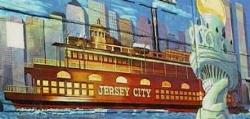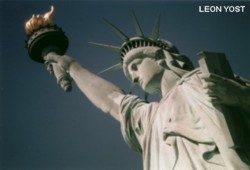 |  |  |
|
| ||
 |  |  |
 |  |  |
|
| ||
 |  |  |
|
|
 Oil painting, painter unknown. |
From Proceedings of the New Jersey Historical Society, January 1965
This Web Version, COPYRIGHT 2004 GET NJ
New Jersey's first experience with a royal governor was to leave a dark and lasting imprint upon the colony's political fabric, the more so since many of his successors were not much better in many respects.
On its face, the setup of royal rule had been well equipped with "checks and balances" which appeared to assure firm control by the Crown, particularly in establishing law and order. The Governor himself was appointed by the Queen. Next came the Governor's Council of twelve men, six from East Jersey and six from West; and although they were residents of the colony, their appointments also were controlled from London. Then came the Assembly of twenty-four members (twelve East Jersey and twelve West), popularly elected. However, to keep out the rabble - the sort of characters involved in riots and head-smashings - the "popular vote" was restricted to those who owned at least a hundred acres of land, while a candidate for membership in the Assembly was required to own at least a thousand acres. With the courts also royally-appointed, New Jersey apppeared to have been tied up in a neat, safe package.
An able, honest and courageous governor might have employed that package to establish the foundations of a stable, prosperous and contented colony. By cementing areas of agreement among the colony's factions; by pressing moderation upon profiteering proprietors; by shrewd leadership in the Assembly, there would have been a chance for effective and possibly popular royal government. Instead, Cornbury craftily pitted each group against the others and fed the fires of disunity and discontent. As a result his governorship served to disclose how full of loopholes the royal package was.
|
Because Cornbury was "for sale", most governors thereafter were driven to the necessity of bargaining with the Assembly on every measure of consequence. Source of the Assembly's power was control of the purse, a power it soon made the most of. Only the Assembly could vote funds and levy taxes. The Governor could veto an Assembly bill; he could not compel it to vote so little as a shilling or so much as a pound. As the Assemblymen became increasingly aware of their strength, one of them, a humble (?) weaver, said: "Let us keep the dogs poore and we'll make them do what we please." The "dogs" included the Governor, his aides and even the court officials. Several stubborn governors were brought to terms when the Assembly refused to appropriate any payroll at all!
| Next |
| A Governor in Skirts First Page |
 Your Ancestors' Story |
 Bruce Springsteen's Jersey Shore Rock Haven! |

|
UrbanTimes.com |